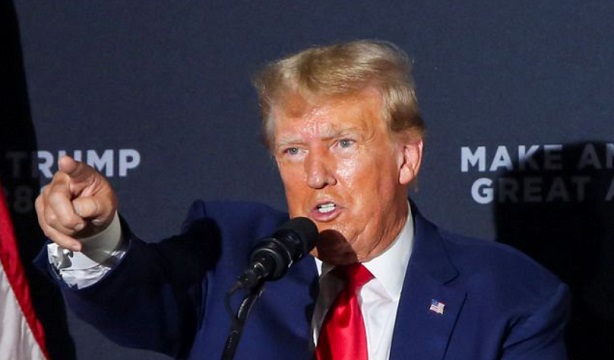
A court in Georgia has charged Donald Trump with trying to illegally overturn the 2020 election.
Among the charges is “solicitation of violation of oath by a public officer” – in other words trying to persuade someone to betray their office.
It is the fourth set of charges against the former president this year.
Fulton County District Attorney Fani Willis brought 13 counts against Trump and 18 of his associates, including forgery and racketeering, which is most often used to target members of organised crime groups.
Read more:
Trump might welcome Georgia election charges, but his co-accused might be tempted to ‘flip’
What are the investigations Donald Trump is facing?
In a press conference, DA Willis gave Trump and all his fellow accused until noon on 25 August to surrender to police.
She added that she hoped to get a trial date within the next six months and planned to try all 19 defendants together.
According to Georgia’s Racketeer Influenced and Corrupt Organizations (RICO) Act it is a crime to participate in, acquire or maintain control of an “enterprise” through a “pattern of racketeering activity” or to conspire to do so.
The scheme the charge relates to does not need to have been successful for it to be considered criminal.
Several other people have been charged including former White House chief of staff Mark Meadows, Trump’s former lawyer and ex-New York mayor Rudy Giuliani and John Eastman, another of Trump’s ex-lawyers.
In a statement passed to US broadcaster NBC by an adviser, Giuliani said: “This is an affront to American democracy and does permanent, irrevocable harm to our justice system. It’s just the next chapter in a book of lies with the purpose of framing President Donald Trump and anyone willing to take on the ruling regime. They lied about Russian collusion, they lied about Joe Biden’s foreign bribery scheme, and they lied about Hunter Biden’s laptop hard drive proving 30 years of criminal activity.
“The real criminals here are the people who have brought this case forward both directly and indirectly.”
The 98-page indictment listed 19 defendants and 41 criminal counts in all.
All the defendants were charged with racketeering, which carries a penalty of up to 20 years in prison.
The court in Atlanta sat beyond usual working hours as a grand jury decided whether or not to charge the former president.
Trump narrowly lost to Joe Biden in Georgia and his lawyers, including Giuliani, made false claims of election fraud.
Audio of a call by Trump to Georgia’s secretary of state also emerged in January 2021 in which he suggested election officials could “find” the votes he needed to win.
Trump is already defending several other cases – just a year before he hopes to reclaim the presidency.
The most serious concern allegations he plotted to overturn his election loss, laying the ground for the infamous US Capitol riots.
He denies the claims and says they are politically motivated.
In a statement, the Trump campaign said: “They could have brought this two and a half years ago, yet they chose to do this for election interference reasons in the middle of President Trump’s successful campaign.
“The legal double standard set against President Trump must end.”
Trump’s other legal troubles include allegations he kept national security documents at his Florida home when he left office.
The ex-president has again pleaded not guilty.
Who are the 18 people charged alongside Donald Trump in Georgia?
Once one of Trump’s top allies in the House of Representatives before becoming the former president’s chief of staff, Mark Meadows is accused of helping fuel the conspiracy by making false statements about the election.
The indictment alleges he also conspired with Trump to develop a plan to disrupt and delay the congressional certification of the electoral votes on 6 January, 2021.
It also alleges he tried to pressure a chief investigator in the Georgia secretary of state’s office, Frances Watson, to speed up the Fulton County signature verification and that he took part in a phone call in which Trump pushed Mr Raffensperger to “find” enough votes to reverse his narrow loss in the state.
Rudy Giuliani, Trump’s former personal lawyer
Once the mayor of New York City and a renowned prosecutor of the mafia, Rudy Giuliani has been better known recently for his association with Trump.
He played a prominent public role in the Trump campaign’s efforts to push false claims of widespread fraud in the 2020 election.
He and other Trump allies are accused of making false statements to Georgia lawmakers about the election, including claims about vote counting errors by Dominion voting machines. Giuliani’s lawyer declined to comment to the Reuters news agency.
John Eastman, former Trump lawyer
Lawyer John Eastman represented Trump in a long-shot lawsuit to overturn voting results in four states Trump lost in 2020.
The Georgia indictment alleges he was part of a plot to appoint fake electors. Electors are the people who cast the state’s electoral college votes for the candidate who won the state.
He has also been under scrutiny, both in Georgia and elsewhere, for penning a series of legal memos which claimed that former vice president Mike Pence could reject electors from certain states to deny Democrat Joe Biden a majority of Electoral College votes.
Jeffrey Clark, former justice official
A former high-ranking official in the justice department, Jeffrey Clark tried to persuade Trump to oust acting attorney general Jeffrey Rosen so he could take over the department and open an investigation into voter fraud in Georgia and other swing states.
The indictment cites Clark’s efforts to persuade Rosen to submit a letter to Georgia falsely claiming the justice department had detected voting irregularities there.
Sidney Powell, former Trump adviser
Sidney Powell is a lawyer who played a leading role in promoting false fraud claims after the 2020 US election.
The indictment accuses her of tampering with electronic ballot markers and tabulators in Coffee County, Georgia, computer theft and unlawfully possessing ballots.
Kenneth Chesebro, Trump campaign lawyer
Kenneth Chesebro is accused in the indictment of helping devise a plan to submit fake slates of electors for Trump.
The Georgia indictment alleges he wrote a memo that provided instructions for how alternate slates of electors in states including Georgia should proceed to meet and cast votes for Trump.
Jenna Ellis, Trump campaign lawyer
The indictment accuses Jenna Ellis of being part of an effort to get false electors appointed by state lawmakers in Arizona, Georgia, Michigan and Pennsylvania.
The court papers assert that she wrote legal memos for Trump on how vice president Pence could delay the certification of Biden’s election win.
David Schafer, Georgia Republican Party chairman
David Schafer is accused of playing a key role in organising and executing the plan to submit an alternate slate of electors.
Serving as the chairman of Georgia’s Republican Party since 2019, Schafer is among those charged with mailing a fake certificate of the so-called Trump electors to a federal courthouse, as well as other offences tied to the fake elector plot.
He is also charged with making false statements to Fulton County investigators.
Michael Roman, Trump 2020 campaign
Michael Roman is accused of playing a role in orchestrating the fake elector plot.
The indictment claims he was in touch with those organising a meeting of the fake Trump electors in Georgia.
Ray Smith III, Trump lawyer
A lawyer who represented Trump in 2020 election challenges in Georgia, Ray Smith III was indicted for allegedly lying to a Georgia Senate committee.
Robert Cheeley, Trump lawyer
A lawyer who represented the former president in Georgia, Robert Cheeley is alleged to have lied to the Georgia grand jury.
The only defendant charged with perjury, it stems from Cheeley’s testimony about the so-called fake electors.
Shawn Still, Republican finance chairman
A member of the Georgia Senate, Shawn Still is among those accused of falsely claiming to be state electoral college voters (electors).
Stephen Lee, an Illinois police chaplain
Also among those indicted is Stephen Lee, who is accused of travelling to the home of Ruby Freeman, a Fulton County election worker, “with intent to influence her testimony”.
Freeman and her daughter Shaye Moss testified to US Congress last year about how Trump and his allies latched onto surveillance footage from November 2020 to accuse both women of committing voter fraud – allegations that were quickly debunked, yet spread widely across conservative media.
Harrison Floyd, executive director of Black Voices for Trump
Harrison Floyd, who has served as director of Black Voices for Trump, is accused of recruiting Lee to arrange a meeting with Freeman and Chicago-based publicist Trevian Kutti.
Trevian Kutti, publicist who represented Kanye West
Prosecutors say that Trevian Kutti claimed to have high level law enforcement connections. They say Freeman met with Kutti at a police precinct, where she brought Floyd into the conversation on a speakerphone.
Prosecutors say Kutti presented herself as someone who could help Freeman but then pressured her to falsely confess to election fraud.
Cathy Latham, former chairwoman of the Coffee County Republican Party
Cathy Latham is one of 16 Georgia Republicans who signed a certificate falsely stating that Trump had won the state and declaring themselves the state’s “duly elected and qualified” electors.
She was at the county elections office for much of the day on 7 January, 2021, and welcomed a computer forensics team that arrived to copy software and data from the county’s election equipment in what the secretary of state’s office has said was “unauthorised access” to the machines.
Scott Hall, 2020 Fulton County Republican poll watcher
Scott Hall is among those charged in relation to events in Coffee County.
He was allegedly involved in commandeering voting information that was the property of Dominion Voting Systems.
Misty Hampton, former Coffee County elections director
Like Hall, Misty Hampton is accused in relation to Coffee County.
She was allegedly present in the county elections office on 7 January, 2021, when a computer forensics team copied software and data from the county’s election equipment.
She also allowed two other men who had been active in efforts to question the 2020 election results to access the elections office later that month and to spend hours inside with the equipment.
TRUMP MIGHT WELCOME THE GEORGIA ELECTION CHARGES, BUT HIS CO-ACCUSED MIGHT BE TEMPTED TO ‘FLIP’
As prosecutors would have it, election interference in Georgia came with a soundtrack.
It’s the one that goes: “Fellas, I need 11,000 more votes, give me a break,” and it’s at the heart of this case.
They were Donald Trump’s words in a recorded phone call between him and Georgia’s secretary of state Brad Raffensperger on 2 January 2021.
Trump was asking the official for votes he didn’t have in an election he didn’t win, and floated the idea of criminal prosecution if he didn’t get them.
Prosecutors believe they have the recording of a criminal committing the crime – of a defeated president ringing round with claims of a rigged election and putting pressure on state officials to help him steal the result.
Whatever it was, it prompted the investigation into election interference in the state of Georgia.
The call in indictment number four already features in number three. Both now have it as a centrepiece in a pattern of behaviour aimed at overturning an election result, allegedly.
Georgia has laid it out in a so-called RICO charge. It’s the Racketeering Influenced Corrupt Organisation Act, a prosecuting tool aimed at targeting mafia crime.
The ‘Don’ at the centre of these new charges faces increased criminal exposure and the list of supporting cast members is also extended, with all the potential they bring for ‘flipping’.
Will targeted individuals, minor players yet with information to divulge, choose to share it and take the target off their back? Prosecutors will hope they are given a push by the rules.
While a federal crime can be subject to presidential pardon (perhaps by a victorious Donald Trump at the next election?), convictions at state level are not.
Alleged co-conspirators might well feel the pressure from a state indictment that doesn’t apply in federal prosecutions elsewhere.
The more detail that’s aired across a ‘suite’ of prosecutions, the more Trump’s alleged assault on US democracy will be laid out publicly. So, of course, will his defence.
Trump has already filed the latest indictment under “witch hunt”. He calls the phone conversation with Brad Raffensperger an “absolutely perfect phone call”. His attorney John Lauro describes it as an “aspirational ask”.
It’s the aspirational defence that will now be a matter for a judge and jury to make a neutral assessment. The partisan view from the Trump camp continues to be supportive.
If a fourth indictment is no surprise to Trump, neither is it a disappointment, if he’s to be believed.
“We need a fourth indictment to close out this election,” he said recently.
Team Trump reckons that when his supporters are told “indictment”, they hear “injustice” and that the greater the detail, the more it is noise ignored.
Source: ![]() news.sky.com
news.sky.com

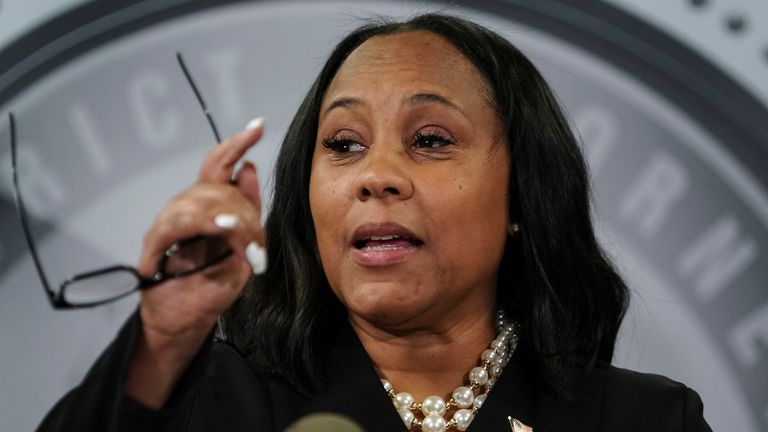
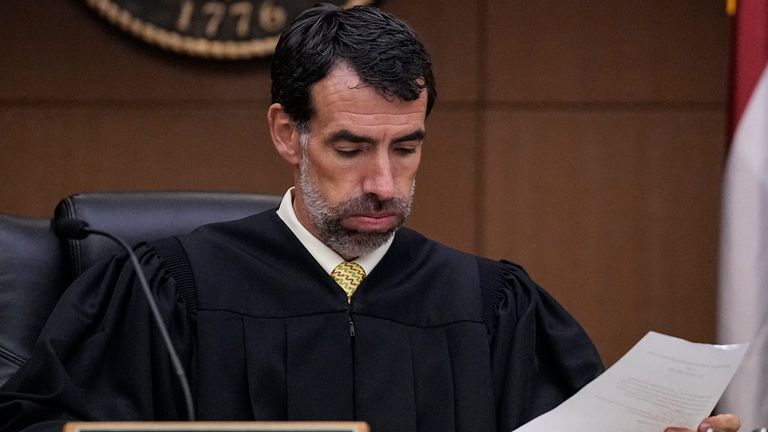
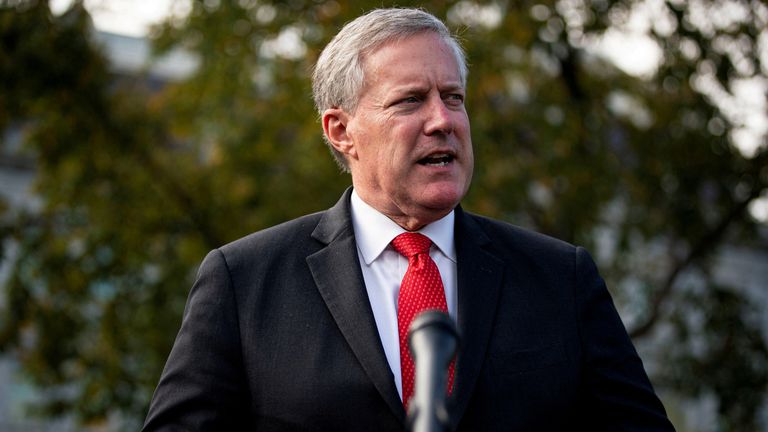
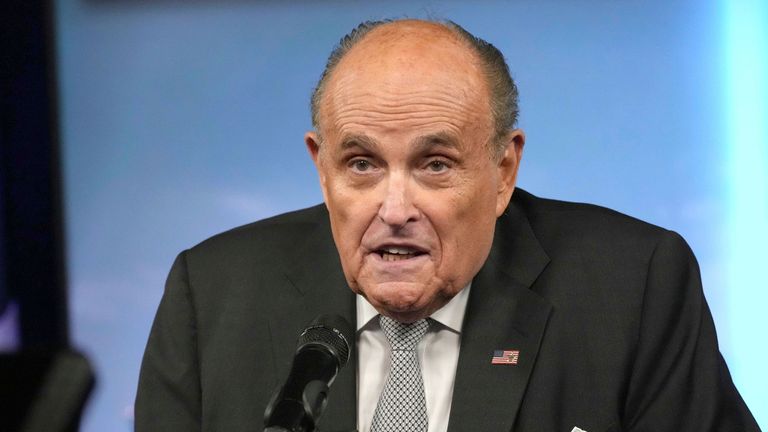
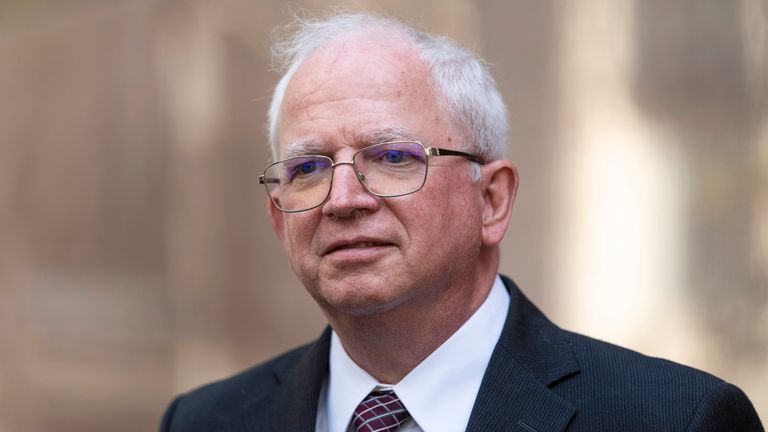
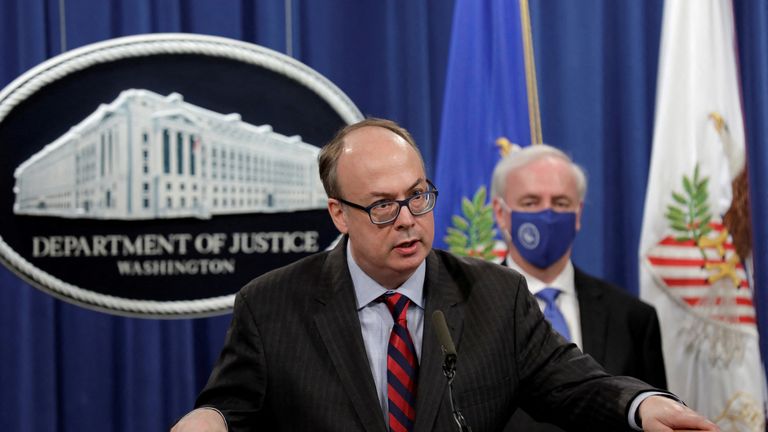
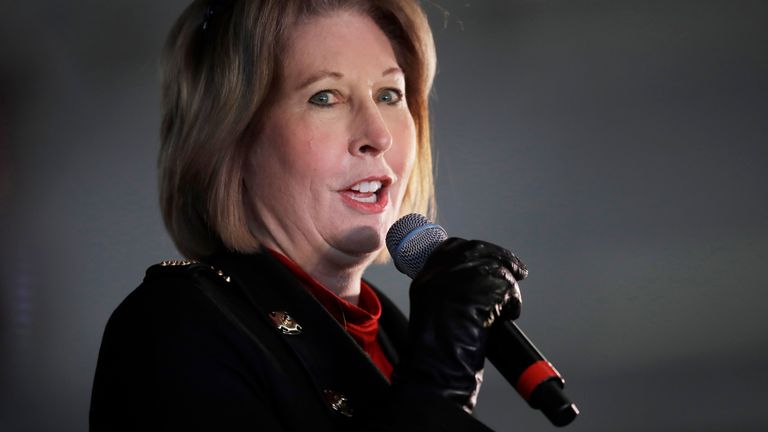
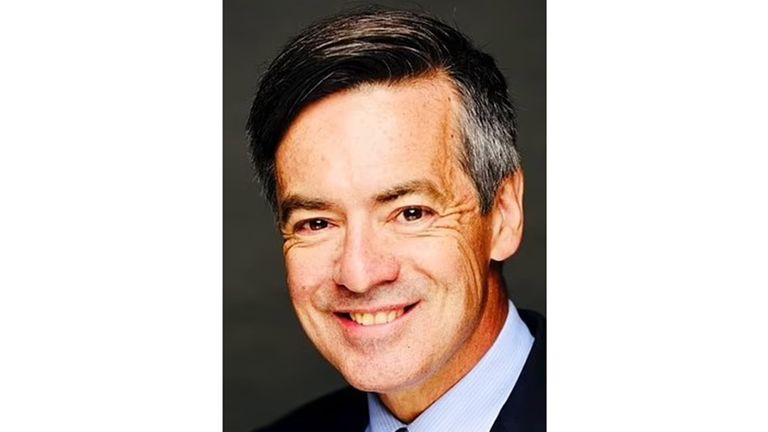
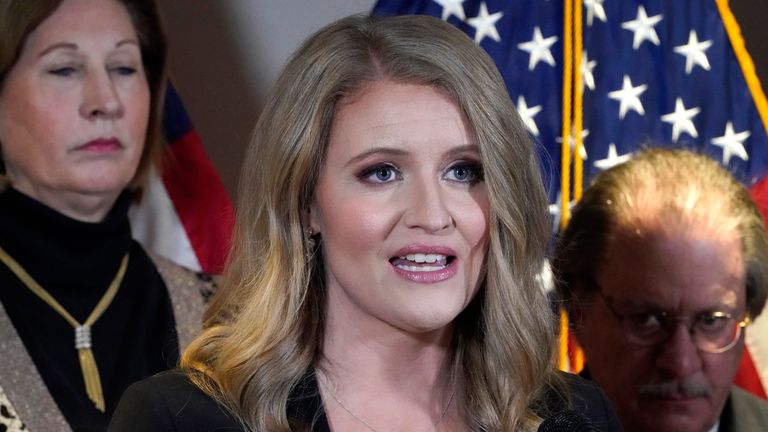
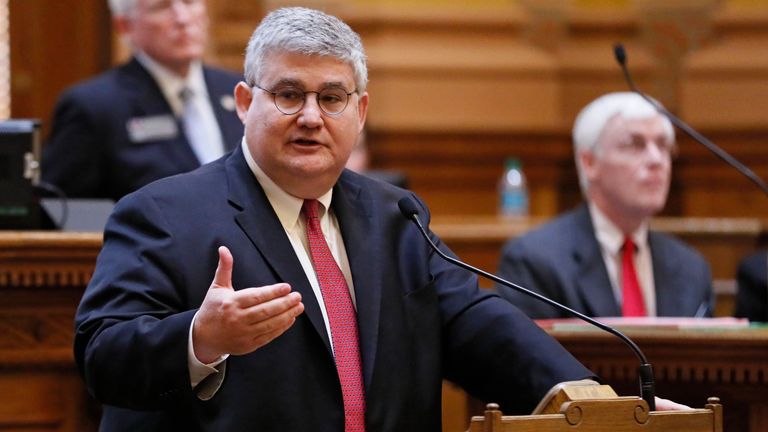

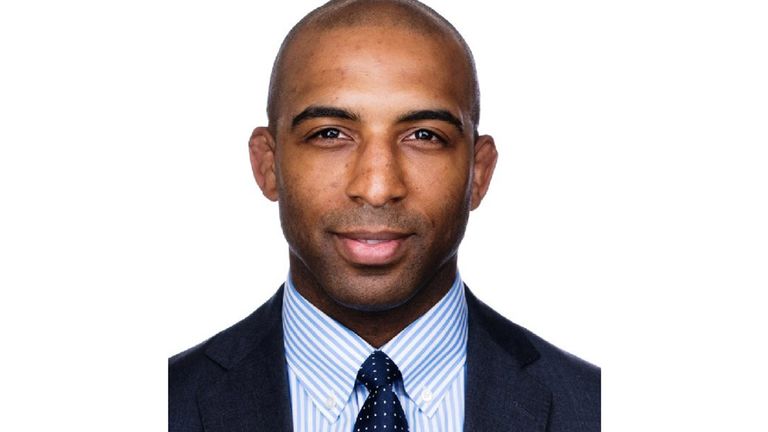
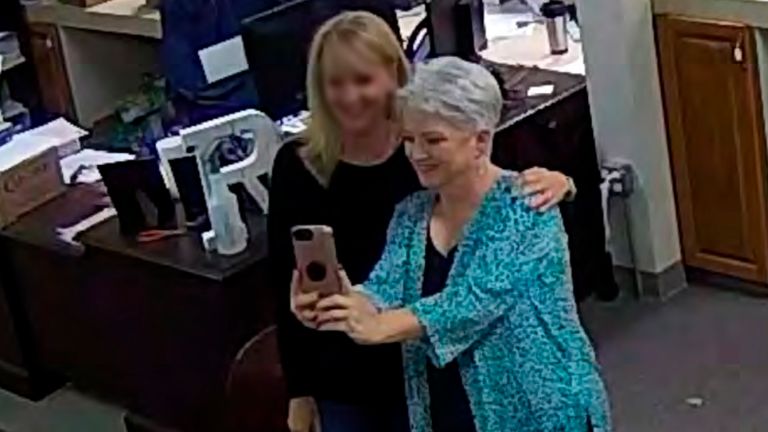


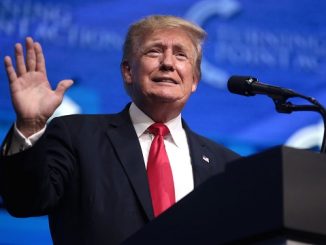
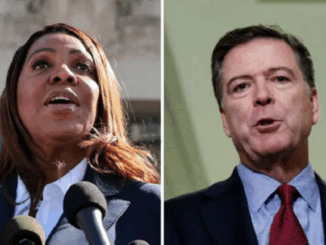
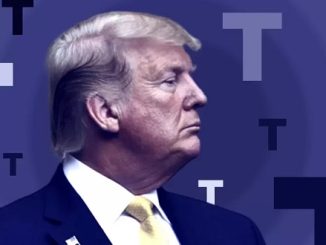
Be the first to comment